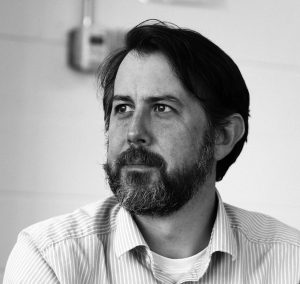Changemakers: Joshua Davis
August 3rd, 2018 | Careers, SIT, SIT Graduate Institute

SIT planted an idea that guides Josh Davis’ thinking every day.
In his role as executive director of an organization serving the homeless in Brattleboro, Vermont, Davis said, “Part of my education from SIT that still rings in my ears is the question: ‘How can we listen to the voices of the people we serve and incorporate that in the work we do?’”
Groundworks Collaborative is a nonprofit organization that meets far more than the immediate needs of the homeless population. The organization runs shelters but also helps clients obtain and keep housing.
“Our goal is for everybody to have a safe and decent place to call home,” Davis said. “Our motto is ‘basic needs met with dignity.’ We’ve got year-round, seasonal, and day shelters, but we also have a food shelf and case management. We work with folk in all stages of homelessness — from those who are currently experiencing homelessness to those we call ‘precariously housed.’”
Solving homelessness may seem ambitious, but to Davis, who received a master’s degree in sustainable development from SIT in 2010, the problem comes down to a few stark realities. “It’s really not an enigma,” he said. “We’re not trying to cure cancer. It’s a three-legged stool.
“First, we need housing stock. There’s only a 1 percent vacancy rate in Brattleboro, and that makes it extremely difficult to get into housing. Second, we need subsidies. If you figure that 30 percent of your income should go to housing, the wage to make that happen is over $20 per hour. Third, we need supportive services. We want to follow folks along their path, and we can dial the services they need up or down.”
The economics of the issue are clear, he said. It costs a lot less to keep people in housing than to have them lose it and have to find their way back. “It’s not that we don’t have enough resources,” Davis pointed out. “We just have to have the political will to use them.”
In his role at the helm of Groundworks, Davis finds that the skills he learned at SIT often come into play. He laughs when he says, “I can’t think without looking at a flip chart; I credit SIT!”
“When I got this position, well, I was in sustainable development, not in management — there were a number of new skills I had to learn. But my experience with SIT was intense. And it included the experience of figuring out something that was new to me. I’d just spent a lot of time and energy doing that, and it carried over into my work.”
Davis also notes that SIT’s emphasis on group work and group dynamics was key to his success. Groundworks is a collaborative merger of the Brattleboro Area Drop-In Center and the Morningside Shelter, both of which had existed on their own for decades.
“At SIT, we had diverse groups of students in terms of gender and age, but also where people were from. That created real opportunities, and also real challenges. SIT’s emphasis on small-group work was such an integral part of studying there, and it translated well to the work I do now.”
SIT’s overarching focus on social justice and critical thinking “made a big impression on me,” Davis said. “It stimulated a lot of great conversation on campus.”
He applies that kind of thinking to the work of addressing the roots of homelessness. It’s led him to try to address a bigger question: “Why are homeless rates so high in this community?”
In his view, SIT plays a large role in creating professionals who are more than just competent leaders, professionals who go beyond the obvious to take on systemic issues.
“I think that at its best, SIT creates professional activists — activists in the professional world. There’s a bent at SIT toward that kind of activism. The work that I do is professional activism — trying to change the conversation around people that are experiencing homelessness, not just Band-Aid talk about systemic problems.”
How do you do that? “Roll up your sleeves. Get involved. You can make change from within.”
